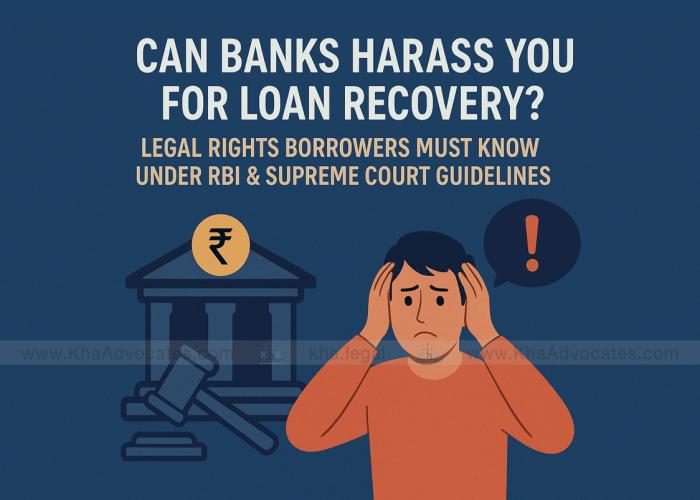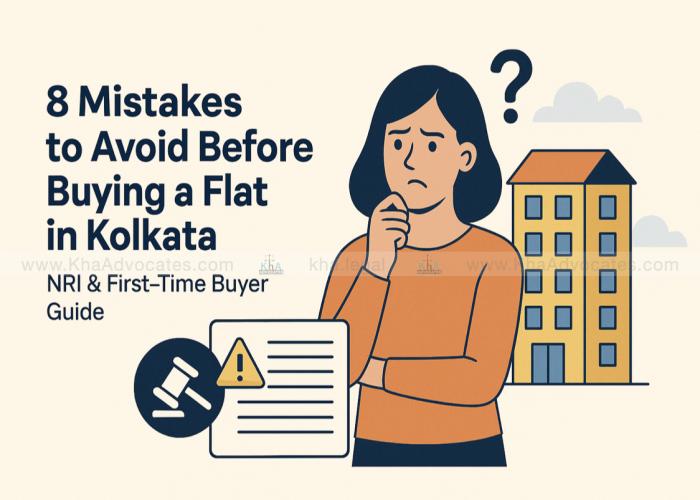
Published on: August 27, 2025 Author: Kabir Hassan, Lawyer
Imagine this—Rahul, a young IT professional from Bangalore, takes a personal loan to manage his wedding expenses. A year later, unexpected medical bills and job uncertainty make it impossible for him to pay EMIs on time. Instead of empathy, he receives daily harassment calls from recovery agents—sometimes late at night, sometimes at his office. His mental peace shatters.
If this sounds familiar, you’re not alone. Thousands of borrowers in India face similar situations every day. The good news? Banks cannot harass you for loan recovery. RBI and the Supreme Court have laid down clear rules to protect borrowers. If you know your rights, you can stand strong against illegal practices.
This blog will explain your legal rights, RBI rules, Supreme Court judgments, and how expert lawyers can help you settle loans legally without harassment.
Banks and NBFCs have the right to recover loans, but the method must be fair, transparent, and lawful. Recovery agents cannot use threats, intimidation, or public humiliation.
The Reserve Bank of India (RBI) regulates how banks can approach borrowers. The Supreme Court of India has also issued strict warnings against coercive recovery tactics.
Yet, in reality, borrowers are often:
Harassed with repeated calls at odd hours
Threatened with property seizure without proper legal notice
Humiliated in front of family or workplace
Mentally tortured, leading to stress, anxiety, even suicides
This is not just unethical—it’s illegal.
The RBI has issued multiple circulars on recovery practices. Here’s what borrowers must know:
✅ No Harassment Calls: Recovery agents can contact you only between 7:00 AM and 7:00 PM.
✅ Proper Identity: Agents must carry valid IDs and authorization letters.
✅ Privacy Protection: They cannot humiliate you at work or disclose your debt to friends/family.
✅ No Physical Force: Threats, abuse, or physical harm are strictly prohibited.
✅ Written Notice: Before initiating recovery, banks must send a proper written notice.
✅ Right to Fair Settlement: Borrowers have the right to negotiate settlement terms legally.
👉 If these rules are violated, you can file a complaint with the RBI, Banking Ombudsman, or take legal action.
The Supreme Court has repeatedly condemned aggressive recovery practices.
ICICI Bank v. Shanti Devi Sharma (2008): The Court held banks accountable for using goons and coercion, stating that such practices violate human rights.
Manager, ICICI Bank v. Prakash Kaur (2007): SC directed banks to stop employing musclemen for loan recovery.
Axis Bank v. State of Punjab (2016): The Court warned that unlawful recovery methods can attract criminal charges.
📌 These judgments reinforce one truth: Banks must recover loans legally, not by harassment.
If you are facing harassment, remember:
🔹 Right to Dignity: No one can insult or threaten you for non-payment.
🔹 Right to Privacy: Your financial situation cannot be publicly disclosed.
🔹 Right to Legal Notice: Banks must serve a proper notice before any recovery action.
🔹 Right to Fair Settlement: You can approach banks for one-time settlement (OTS) or restructuring.
🔹 Right to Complain: File complaints with RBI Ombudsman, police, or consumer forum if harassed.
Case Example:
Priya, a small business owner from Delhi, defaulted on her business loan during COVID-19. Recovery agents visited her shop daily, threatening to seize goods.
She approached a legal team specializing in loan settlement services. The lawyers:
Sent a legal notice to the bank stopping harassment
Negotiated a one-time settlement at 40% lesser payment
Protected her from illegal seizure
Today, Priya is debt-free and running her business with confidence.
👉 This shows that legal support can transform financial struggles into fresh starts.
If banks or agents cross the line, take these steps:
Stay Calm, Don’t React: Avoid verbal fights or signing anything under pressure.
Document Everything: Record calls, keep notices, and save SMS/emails.
File a Complaint: Write to the bank’s grievance cell → RBI Ombudsman → Police (if threats).
Seek Legal Help: A loan settlement lawyer can negotiate, protect your rights, and stop harassment immediately.
Loan disputes can feel overwhelming, but with expert legal help, you can:
✔️ Stop harassment from recovery agents
✔️ Negotiate a lower one-time settlement
✔️ Restructure your loan legally
✔️ Protect your property from illegal seizure
✔️ File cases against banks violating RBI guidelines
At KHA Advocates, we specialize in loan settlement and borrower protection cases. Our team has helped individuals and businesses reduce debt, stop harassment, and rebuild financial freedom.
Debt can make you feel cornered—but remember, you are not alone. Many honest borrowers face temporary hardships due to job loss, medical expenses, or market slowdown. That doesn’t make you a criminal.
Banks must follow the law. If they harass you, the law is on your side.
Banks have the right to recover money, but not by violating your dignity. RBI guidelines and Supreme Court judgments make it clear—harassment is illegal.
If you’re facing harassment, don’t suffer in silence. Take legal action, negotiate your loan legally, and rebuild your life with confidence.
👉 Facing bank harassment for loan recovery? Know your rights and get legal help today.
Contact KHA Advocates for expert Loan Settlement Legal Services.
🌐 Visit: www.khaadvocates.com/loan-settlement

